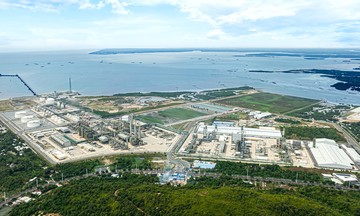The full text of the Resolution:
Over nearly 40 years of renovation, Vietnam's private sector has grown in both size and quality, becoming a key driver of the socialist-oriented market economy. The private sector comprises over 940,000 enterprises and over 5 million household businesses. It contributes approximately 50% of GDP, over 30% of state budget revenue, and employs about 82% of the workforce. This sector fuels economic growth, job creation, and innovation, enhancing national competitiveness and contributing to poverty reduction and social stability. Many private enterprises have flourished, establishing their brands and expanding into regional and global markets.
However, the private sector still faces obstacles hindering its development. It hasn't yet reached its full potential in scale and competitiveness, falling short of expectations as the backbone of the national economy. Most businesses are micro, small, and medium-sized enterprises with limited financial resources and management expertise. Technological capacity and innovation remain low, affecting productivity, operational efficiency, and competitiveness. A lack of strategic vision and limited connections with state-owned enterprises and foreign-invested enterprises also pose challenges.
Several factors contribute to this situation, primarily: An incomplete understanding of the private sector's role in the economy; inadequate institutions and legal frameworks; insufficient leadership and direction; and inadequately protected property rights and freedom of business. Private businesses also face difficulties accessing resources, especially capital, technology, land, and skilled labor. Some preferential policies and support mechanisms are ineffective and difficult to access, while business costs remain high.
To achieve the national development goals outlined in the 13th National Party Congress Resolution and meet the demands of the new era, a comprehensive and innovative approach is needed. This involves shifting mindsets, unifying perceptions and actions to fully leverage the private sector's role, fostering confidence, and generating new momentum for economic growth and enhanced national competitiveness.
Given this context, the Politburo mandates the focused, decisive, and effective implementation of the following:
I- GUIDING PRINCIPLES
1. In the socialist-oriented market economy, the private sector is a crucial driver of the national economy. It is a leading force in promoting growth, job creation, productivity enhancement, national competitiveness, industrialization, modernization, and restructuring the economy towards a green, circular, and sustainable model. Along with state-owned, collective, and cooperative economies, the private sector plays a core role in building an independent and self-reliant economy integrated with extensive, substantive, and effective international cooperation, steering the country away from the risk of lagging behind and towards prosperous development.
2. Developing a rapid, sustainable, efficient, and high-quality private sector is both an urgent priority and a long-term strategic task. It must be integrated into national development strategies and policies to unlock all potentials, liberate productive forces, and effectively mobilize and utilize all resources, especially those of the people, for socio-economic development, national defense and security enhancement, and international cooperation.
3. Eliminate all prejudices against Vietnam's private sector and acknowledge its importance to national development. Nurture and encourage entrepreneurship and innovation, respecting businesses and entrepreneurs as warriors on the economic front. Guarantee property rights, freedom of business, and equal competition, allowing businesses to operate freely in all sectors not prohibited by law. Build trust between the state and the private sector, protecting the legitimate rights and interests of businesses and entrepreneurs. Ensure equal competition in accessing business opportunities and economic resources, especially capital, land, technology, human resources, data, and other legal resources, as prescribed by law.
4. Create a transparent, stable, secure, and easy-to-implement business environment with low costs and international standards, ensuring regional and global competitiveness. Develop breakthrough laws, mechanisms, and policies to encourage private sector development in priority areas, R&D investment, science and technology application, innovation, digital transformation, and participation in important national strategic tasks, reaching regional and global scales. Promote creative startups, digital transformation, and legitimate wealth creation.
5. Strengthen the Party's leadership and the state's facilitating role, centering on businesses as the main actors. Focus on training entrepreneurs with strong ethics, business acumen, resilience, intellect, dynamism, and creativity. Honor, encourage, and develop a strong entrepreneurial force with patriotism, national pride, a desire to contribute, respect for the law, and active social responsibility.
II- OBJECTIVES
1. By 2030:
- The private sector will be a primary driver of the national economy and a leading force in science and technology development, innovation, and digital transformation, contributing to the successful implementation of Resolution 57-NQ/TW, dated 22/12/2024, of the Politburo and other Party guidelines.
- Strive for 2 million operating businesses, with 20 businesses per thousand people. Have at least 20 large enterprises participating in global value chains.
- Achieve an average annual growth rate of 10-12% for the private sector, exceeding the overall economic growth rate. Contribute about 55-58% of GDP, 35-40% of state budget revenue, and provide employment for 84-85% of the workforce. Increase labor productivity by an average of 8.5-9.5% annually.
- Achieve a level of technological capacity, innovation, and digital transformation among the top 3 ASEAN countries and the top 5 in Asia.
2. Vision to 2045:
A rapidly, strongly, and sustainably developing Vietnamese private sector actively participating in global production and supply chains, with high regional and international competitiveness. Strive for at least 3 million operating businesses by 2045, contributing over 60% of GDP.
III- TASKS AND SOLUTIONS
1. Renew mindsets, unify perceptions and actions, inspire national confidence and aspirations, and create new momentum for private sector development.
- Ensure consistent understanding among all Party committees, authorities, the political system, the business community, and the public regarding the private sector's position and role. Strengthen confidence, aspirations, and decisive action within the private sector. The state will facilitate, serve, and support the private sector's rapid and sustainable development, refraining from administrative intervention in production and business activities that contradict market principles. Build open, friendly, and collaborative relationships between authorities and businesses, focusing on integrity and development.
2. Promote reform, improve institutional and policy quality, and effectively protect property rights, freedom of business, and equal competition for the private sector, ensuring contract enforcement.
3. Facilitate private sector access to land, capital, and high-quality human resources.
4. Promote science, technology, innovation, digital transformation, green transition, and efficient, sustainable business practices in the private sector.
5. Enhance connections among private enterprises, between private and state-owned enterprises, and with foreign direct investment (FDI) enterprises.
6. Rapidly develop large and medium-sized enterprises and private economic groups with regional and global reach.
7. Provide effective support to small, micro enterprises, and household businesses.
8. Uphold business ethics, promote social responsibility, foster entrepreneurship, and facilitate entrepreneurs' participation in national governance.
IV - IMPLEMENTATION
Specific instructions for implementation are provided to relevant party committees and government bodies.












